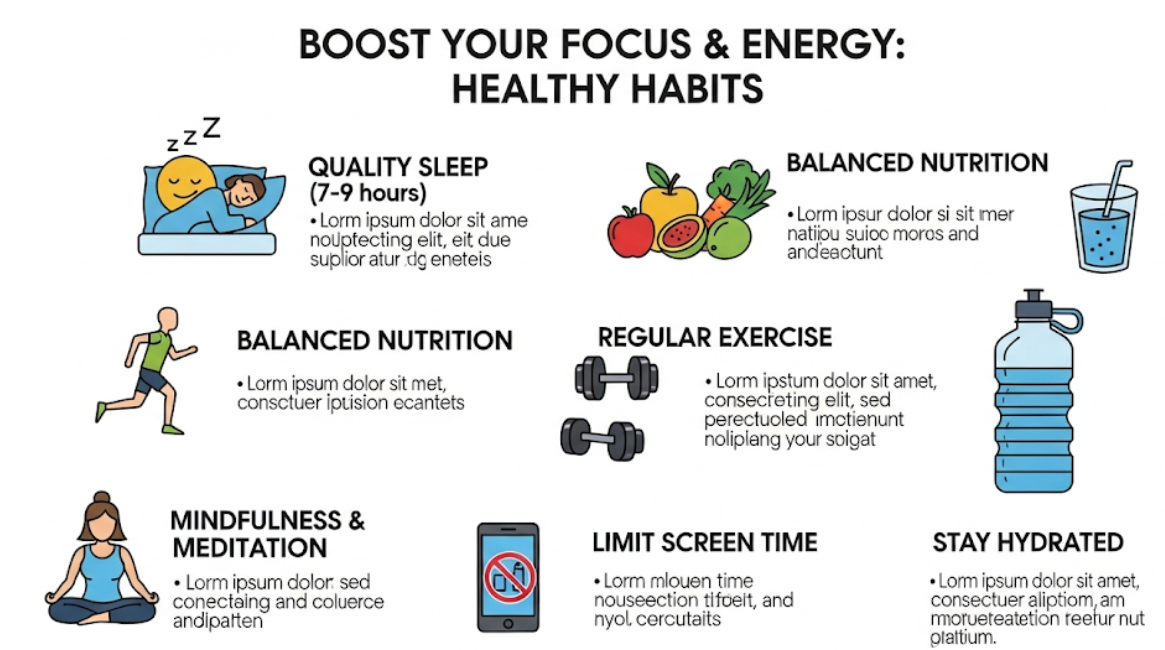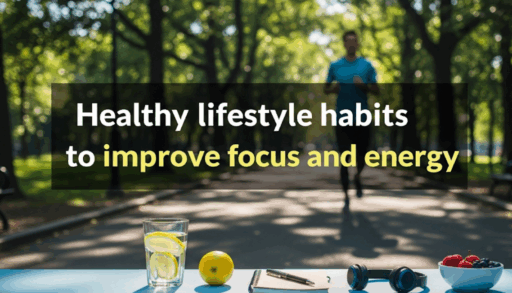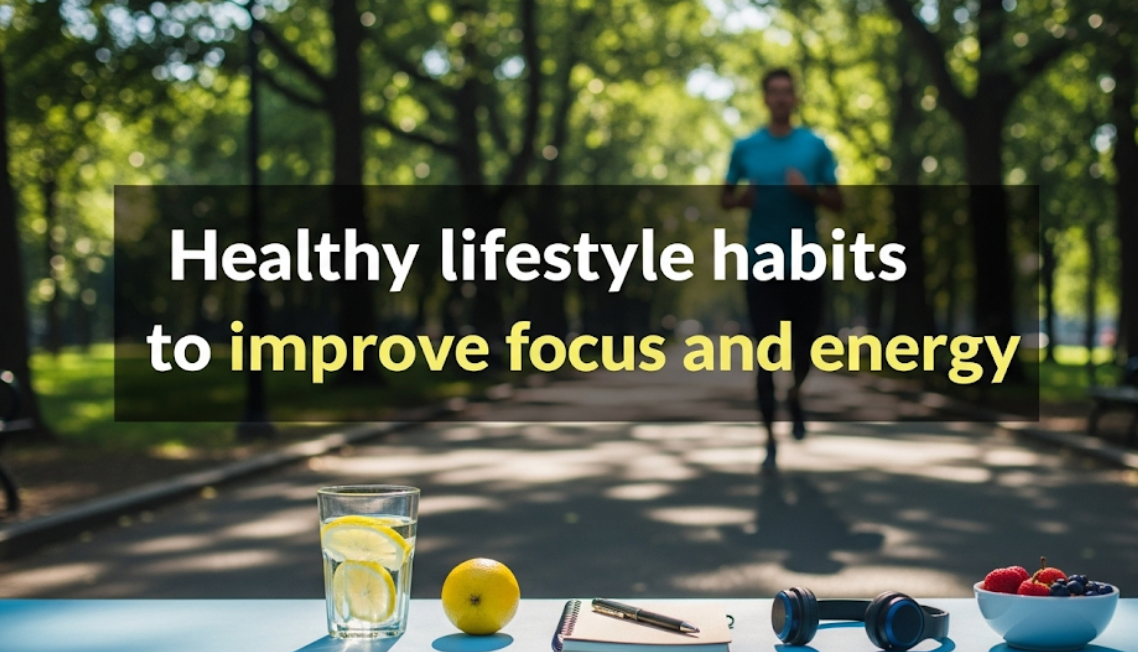8 Healthy Habits for More Focus + Energy
Do you struggle to concentrate at work or always feel the need to nap by 2 pm? You’re not alone. Each day, millions of people fight against the tide with mental fog and lethargy — lost for focus. The good news is that some tiny tweaks to your daily routine can make a world of difference in how sharp you are and also how energized you feel.
For them to function properly, your brain requires the appropriate nutrition, rest and setting. By giving your body what it really needs, you will notice clearer thinking, better memory and balanced energy – no dips and valleys throughout the day. In this post, you will learn how to increase your focus and energy naturally with articles to back the science behind these tips.
Every move you make affects your brain, from breakfast to bedtime. Below we take a look at some of the best healthy habits for you to consider so that you will feel and think differently.
Smart Food Choices to Fuel Your Brain
One obvious side effect of this is that you won’t think as straight or be nearly as alert. Your brain takes up around 20% of your total daily calories, so you need to put in the right kind if you want it to work properly.
Common Brain Foods That Can Actually Work
The worst choices for focus and energy come from foods that lead to a quick burst of blood sugar — followed by the inevitable crash. The whole picture — foods that provide nutrients without damaging your hormones, sugar regulation, or brain functions:
Top Brain-Boosting Foods:
- Fatty fish (salmon, sardines, mackerel) – They are filled with omega-3 fatty acids which are good for the brain.
- Blueberries — Loaded with antioxidants to protect brain cells and improve memory
- Dark leafy greens (spinach, kale, broccoli) — Folate and vitamin K for cognitive functioning
- Nuts & seeds — For healthy fats, protein and Vitamin E brain protective properties.
- Complex carbs — Maintain stable blood sugar for balanced energy; Whole grains
- Eggs — Choline for neurotransmitters and focus
Meal Timing for High Performance
WHAT you eat is as vital as WHEN you eat it. Your body was designed to follow the rhythms of nature, and when you eat at the right times, your energy stays even all day.
Optimal Eating Schedule:
- Morning (7-9 am): High-protein breakfast within 2 hours of waking.
- Mid-Morning (10:00-11:00am): View your schedule for the rest of the morning — if you need a snack here (i.e. running errands with kids, working at physical labor site), choose from healthy options.
- Lunch (12-2PM): A balanced meal including protein, healthy fats, and complex carbohydrates
- Mid Afternoon (3-4 PM): Keep energy up so you can power through the day!
- Dinner (6–8 PM): Early lighter dinner at least 3 hours before bedtime
Hydration: The Simple Energy Booster
Even mild dehydration can leave you tired and mentally fuzzy. Since your brain consists of about 75% water, it is particularly important not to be dehydrated for mental clarity.
Impact of dehydration level on performance:
- 2% body weight loss: Reduced attention and memory
- 3% body weight loss: Mood issues and difficulty concentrating
- 4% body weight loss: Significant cognitive decline
Daily Hydration Tips:
- First thing in the morning, have a glass of water.
- Have a water bottle on your desk
- Hydrate yourself by eating water-rich foods such as cucumbers, watermelon, soup.
- Limit caffeine to avoid dehydration
- Monitor color of urine — clear is best
Sleep: The Secret Weapon to Sharper Minds
Sleep is like rebooting your brain, cleansing the toxins which all gathered while you were thinking. Sleep clears toxins from the brain, maintains long-term memory and prepares us for the following day. One of the quickest ways to murder your focus and energy is by having poor sleep habits.
Building the Perfect Sleep Environment
Make your bedroom a sleep retreat. A few tweaks to your sleep environment can make all the difference in how rested you feel.
Sleep Environment Checklist:
- Maintain a room temperature of 65-68°F (18-20°C).
- Blackout curtains or an eye mask
- Reduce noise with ear plugs or a white-noise machine
- Remove electronic devices or use blue light filtering
- Go with a supportive mattress and pillows
- Keep the room free of clutter
3-2-1 Sleep Rule for Better Rest
This one simple rule helps your body prepare for sleep naturally.
- 3 hours before bed: No big meals
- 2 hours before bedtime: No work, or doing anything stressful
- 1 hour prior to bedtime: No screens
Quick Energy Recharge: Power Napping
A strategic nap can sharpen your attention and cognitive functioning. The trick is nap length and timing!
Effective Napping Guidelines:
- Time Required: 10-20 minutes to increase alertness, 60-90 minutes for new learning
- When to nap: 1-3 p.m. during energy dip hours
- Environment: Dark, quiet, and cool
- Don’t do: Naps longer than 30 minutes and napping after 3 PM
Get Up and Move Your Body to Clear Your Mind
One of the best things for reducing brain fog is exercise. Working out pumps more oxygen to the brain, releases feel-good hormones and makes you sleep like a rock.
Quick Workouts for Busy Schedules
Even a small amount of time dedicated to exercise produces benefits. Short bursts of activity scheduled as breaks throughout the day can work just as well when it comes to improving cognitive performance.
5-Minute Energy Boosters:
- Jumping jacks – 30 seconds on, 10 seconds rest, perform 5 times
- Desk Push-Ups: 3 sets of 10 on your desk or against your wall.
- Stair Climbing — A few times, up 2–3 floors
- Neck rolls, shoulder shrugs, spinal twists
- 4-7-8 Breathing: Take a deep breath (inhale for 4 seconds), hold for 7, slowly exhale for 8
The Brain-Body Connection — How Exercise Can Improve Focus
Physical exercise can create permanent changes in your brain that lead to better cognitive function:
- Brain-derived neurotrophic factor (BDNF): Working out increases BDNF, which spurs new brain cell growth
- Increased blood circulation: Better vascular flow allows more oxygen and nutrients to be sent to your brain
- Decreased cortisol: Exercise reduces brain-cell killing stress hormones
- Improved neurotransmitter balance — Increases levels of dopamine, norepinephrine and serotonin for improved mood and focus
Incorporate Physical Activity into Your Daily Routine
Even a perfect exercise routine is only as good as your adherence to it. Look for little ways to incorporate movement into your day without interrupting your workflow.
Movement Integration Strategies:
- Take phone calls while walking
- Work while using a standing desk
- When the weather is clear, park a little further away or get off the bus a stop earlier.
- Use the stairs instead of elevator
- Fit in body-weight exercises during TV commercial breaks.
- Schedule walking meetings when possible
Manage Stress to Preserve Your Mental Energy
Chronic stress is the kryptonite of focus and energy. Your body creates cortisol when you’re stressed, which disrupts memory retrieval and impedes decision-making. Stress management is one of the major keys to peak mental performance.
Simple Stress-Busting Techniques That Work
Stress can be managed using evidence-based techniques that can be done anywhere, at anytime:
Immediate Stress Relief (1-5 minutes):
- Box breathing: Inhale 4 counts, hold 4, exhale 4, hold 4
- Progressive muscle relaxation: Tense and release different groups of muscles.
- 5-4-3-2-1 technique: Notice 5 things you can see, 4 things you can hear, 3 things you can touch, 2 things you can smell and 1 thing you can taste
- Positive self-talk: Replace negative thoughts with supportive ones
Daily Stress Management (10-30 minutes):
- Meditation or mindfulness practice
- Journaling about thoughts and feelings
- Gentle yoga or stretching
- Listening to calming music
- Spending time in nature
Creating Boundaries for Better Focus
The most important way that you can save your mental energy is by saying no to things that drain it unnecessarily. Establishing strong boundaries is one way of maintaining focus on what really matters to you.
Boundary-Setting Strategies:
- Time boundaries: Choose set hours for work, rest, play
- Tech boundaries: Create phone-free zones and hours
- Social boundaries: Spend less time around energy vampires
- Mental boundaries: Do not let people put their problems on you.
- Physical boundaries: Have separate areas for each activity.
Use Technology Smartly to Get You in The Zone
Technology can either facilitate or inhibit your concentration. The trick is to purposefully use rather than passively allow devices to snatch away your attention.
Taming the Digital Distraction Monster
People in general are checking their phones 96 times a day. This constant state of interruption divides your attention and makes it difficult to give important things the deep focus they need.
Digital Detox Strategies:
- Morning phone-free time: Your first hour awake is for showering, brushing teeth, and having breakfast; keep away from checking your phone.
- Control the notifications: Completely disable non-important push notifications.
- App Limits: Implement Screen Time limits to stop being sucked into social media.
- Phone Location: Leave it in another room when doing work
- Scheduled Check-Ins — Designate specific times when you will check messages to avoid constantly replying.
Using Technology to Boost Productivity
Technology, when utilized properly, can also increase your focus as well as energy levels.
Helpful Apps and Tools:
- Focus apps: Forest, Freedom or Cold Turkey helps you block distracting websites.
- Meditation apps: Headspace, Calm, or Insight Timer for stress and anxiety
- Sleep tracking: Track sleep quality with your phone or wearables
- Hydration reminders: Apps to remind you to drink water
- Task management: Great tools to keep organized are apps like Todoist, Notion or simple calendar apps.
Sustainable Habits: The Routine Difference
Establishing regular daily routines makes healthy living easy. When habits become automatic responses, you will not need to muster up any willpower to continue practicing them.
Morning Routines That Will Make You Successful
The way you start your day sets the template for how you will perform that day. How you wake up will dictate your energy and focus for the next 16 hours. How you start the morning can leave you feeling like a scatter-brained mess or like you’re in control of your world.
An Invigorating Morning Routine:
- The same wake time each day, yes even on weekends
- Immediate hydration (glass of water upon waking)
- Movement (stretching, exercise, or walking)
- Meditation, deep breathing, or gratitude practice
- A healthy breakfast (protein and healthy fats)
Wind Down with Evening Rituals that Can Help You Sleep Better
How you end the day is just as important as how you start it. Your evening routine will make the difference between quality sleep and restless nights.
Calming Evening Routine Ideas:
- No screens for an hour before bed (digital sunset)
- Stretching or very gentle yoga to release stress and tension
- Reading a book or magazine
- Expressing gratitude — notice 3 good things each day
- Chamomile or passionflower herbal tea
- Consistent bedtimes to keep your biological clock in check
Creating Habits that Stick: The 21-Day Challenge
Studies have shown that it takes about 21 days to develop a new habit. Take it one or two habits at a time, and know that consistency is more important than perfection.
Habit Formation Tips:
- Start small: Easy habits so simple that failure is not an option
- Stack habits: Link new habits to existing ones
- Track progress: Use a basic habit tracker or calendar to chart progress
- Celebrate wins: Acknowledge your victories, big and small.
- Anticipate roadblocks: Prepare for obstacles in advance.
The Effects of Environment on Your Mental Performance
Environment significantly impacts whether you can concentrate and stay alert. Small adjustments to your environment can lead to big mental shifts.
Setting Your Workspace for Maximum Results
Whether you work from home or in an office, your workspace needs to be conducive to concentration with minimal distractions.
Workspace Optimization Checklist:
- Natural light: If you can, place your desk near a window.
- Clutter-free workspace: Keep your work area neat and minimal
- Ergonomic setup: Reduce tiredness due to poor posture
- Plants: Green plants improve air quality and decrease stress
- Temperature control: Keep the room cool but comfortable (68–72°F)
- Noise management: Use noise-canceling headphones or white noise

How Light Impacts Energy and Focus
Light exerts direct influence on your circadian rhythm: your internal clock that signals when you should feel awake and when you should feel sleepy. How you manage light throughout the day has a significant impact on energy levels.
| Time of Day | Light Recommendation | Effects on Energy |
|---|---|---|
| Morning (6-10 AM) | Bright blue-rich light | Wakes you up and raises cortisol levels |
| Midday (10 AM-4 PM) | Natural sunlight if available | Maintains alertness |
| Evening (4-8 PM) | Warm, dim lighting | Prepares body for rest |
| Night (8PM — 6AM) | Minimal light | Helps produce melatonin |
Light Management Strategies:
- Get 10-15 minutes of sunlight in the morning
- Use a light therapy lamp during winter or gloomy days.
- Get outside during the work day
- Use blue light filters on your devices.
- Switch to soft yellow bulbs for evening lighting
Social Connections and Mental Energy
The people around you either energize or drain you. Surrounding yourself with positive people and maintaining healthy social boundaries is a crucial part of staying high energy and focused.
Energy Givers vs. Energy Takers
Surround yourself with people who lift you up and recognize when people drag you down. Spending time with energy givers and limiting exposure to energy takers is an effective way to protect your mental resources.
Characteristics of Energy Givers:
- Listen more than they talk
- Offer support and encouragement
- Respect your boundaries and time
- Share positive experiences and insights
- Help you grow and learn
Characteristics of Energy Takers:
- Get into complaining and problem-focused conversations.
- Interrupt or ignore you while you are talking
- Make everything about themselves
- Create drama or conflict
- Leave you feeling exhausted after spending time with them
Building a Supportive Network
You become who you associate with, and it helps to be around others who value health and growth the way that you do. This makes it much easier to maintain good habits and stay consistent.
Ways to Find Like-Minded People:
- Take part in fitness classes or sports clubs.
- Take classes on subjects you enjoy
- Get involved with a cause you support
- Join online forums about health and wellness
- Start or join a walking group, book club or hobby group.
Your Action Plan: What You Need to Do In The Next 30 Days
Trying to juggle multiple changes simultaneously is overwhelming and usually results in giving up. Instead, focus on developing one good habit at a time for long-term success.
Week 1-2: Foundation Building
Begin with the habits that are most likely to impact your energy and attention:
Daily Non-Negotiables:
- Drink a glass of water first thing upon waking
- Go to bed and rise at the same time daily.
- Take a 10-minute walk outside
- Eat a protein-rich breakfast
- Leave your phone in another room while working.
Week 3-4: Body and Mind
Only after you master a few foundation habits, layer these practices on top:
New Additions:
- 5-minute morning stretching routine
- Take 3 deep breaths before every important task
- Prepare healthy snacks in advance
- 15-minute evening wind-down routine
- Take one break from social media during the day
Beyond 30 Days: Advanced Strategies
Once you have the foundational elements down, experiment with these techniques:
Advanced Practices:
- Meditation (begin with 5 minutes/day)
- Intermittent fasting — Not recommended without consultation with a healthcare provider
- Cold exposure (cold showers, ice baths)
- Sleep optimization (sleep tracking, temperature regulation).
- Red light therapy and nootropics with medical oversight
Start Your Journey To Better Focus And Energy Today
Better focus and energy don’t require drastic changes or expensive supplements. Some of the most effective strategies are often the simplest ones: getting quality sleep, eating nutritious whole foods, moving regularly, and managing stress effectively.
Remember, building new habits takes patience and time. Focus on consistency over perfection, and celebrate small wins along the journey. Just choose one or two changes from this article and add others as these become more automatic.
You are never too young or too old to optimize your mental performance. Putting these strategies into practice will not only help you focus better and increase your energy, but will also positively impact your life in general. The investment you make in your health today will pay dividends for years to come.
So, what is the first healthy habit you are going to commit to starting this week? Choose something that feels doable and appealing, and take the first step toward your most focused, energetic self.




